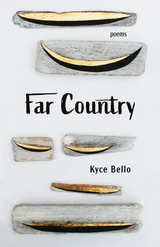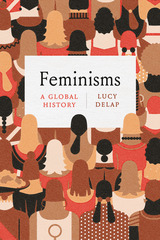8 books about Climatic changes in literature
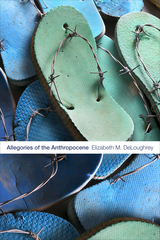
Allegories of the Anthropocene
Elizabeth M. DeLoughrey
Duke University Press, 2019
In Allegories of the Anthropocene Elizabeth M. DeLoughrey traces how indigenous and postcolonial peoples in the Caribbean and Pacific Islands grapple with the enormity of colonialism and anthropogenic climate change through art, poetry, and literature. In these works, authors and artists use allegory as a means to understand the multiscalar complexities of the Anthropocene and to critique the violence of capitalism, militarism, and the postcolonial state. DeLoughrey examines the work of a wide range of artists and writers—including poets Kamau Brathwaite and Kathy Jetñil-Kijiner, Dominican installation artist Tony Capellán, and authors Keri Hulme and Erna Brodber—whose work addresses Caribbean plantations, irradiated Pacific atolls, global flows of waste, and allegorical representations of the ocean and the island. In examining how island writers and artists address the experience of finding themselves at the forefront of the existential threat posed by climate change, DeLoughrey demonstrates how the Anthropocene and empire are mutually constitutive and establishes the vital importance of allegorical art and literature in understanding our global environmental crisis.
[more]
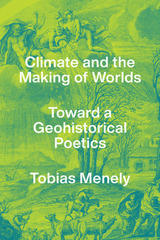
Climate and the Making of Worlds
Toward a Geohistorical Poetics
Tobias Menely
University of Chicago Press, 2021
Winner of the Society for Literature, Science, and the Arts Michelle Kendrick Memorial Book Prize and the Center for Robert Penn Warren Studies Warren-Brooks Award.
In this book, Tobias Menely develops a materialist ecocriticism, tracking the imprint of the planetary across a long literary history of poetic rewritings and critical readings which continually engage with the climate as a condition of human world making. Menely’s central archive is English poetry written between John Milton’s Paradise Lost (1667) and Charlotte Smith’s “Beachy Head” (1807)—a momentous century and a half during which Britain, emerging from a crisis intensified by the Little Ice Age, established the largest empire in world history and instigated the Industrial Revolution. Incorporating new sciences into ancient literary genres, these ambitious poems aspired to encompass what the eighteenth-century author James Thomson called the “system . . . entire.” Thus they offer a unique record of geohistory, Britain’s epochal transition from an agrarian society, buffeted by climate shocks, to a modern coal-powered nation. Climate and the Making of Worlds is a bracing and sophisticated contribution to ecocriticism, the energy humanities, and the prehistory of the Anthropocene.
In this book, Tobias Menely develops a materialist ecocriticism, tracking the imprint of the planetary across a long literary history of poetic rewritings and critical readings which continually engage with the climate as a condition of human world making. Menely’s central archive is English poetry written between John Milton’s Paradise Lost (1667) and Charlotte Smith’s “Beachy Head” (1807)—a momentous century and a half during which Britain, emerging from a crisis intensified by the Little Ice Age, established the largest empire in world history and instigated the Industrial Revolution. Incorporating new sciences into ancient literary genres, these ambitious poems aspired to encompass what the eighteenth-century author James Thomson called the “system . . . entire.” Thus they offer a unique record of geohistory, Britain’s epochal transition from an agrarian society, buffeted by climate shocks, to a modern coal-powered nation. Climate and the Making of Worlds is a bracing and sophisticated contribution to ecocriticism, the energy humanities, and the prehistory of the Anthropocene.
[more]
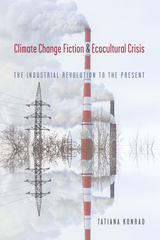
Climate Change Fiction and Ecocultural Crisis
The Industrial Revolution to the Present
Tatiana Konrad
University of Nevada Press, 2024
Concentrating on a powerful, emerging genre, Tatiana Konrad’s Climate Change Fiction and Ecocultural Crisis provides a survey of popular narratives that further our understanding of climate change in contemporary fiction. Konrad advocates for the expansion and redefinition of the cli-fi genre and argues that industrial fiction from the nineteenth century is the first example of climate change fiction. Tracing the ways through which cli-fi outlines a history of our modern ecocultural crisis, this book demonstrates how the genre employs four major thematic clusters to achieve this narrative: weather, science, religion, and place.
Focusing on a diverse range of issues, including fossil fuels, cheap energy, the intricacies of human–more-than-human relationships, and postcolonial geographies, Konrad illustrates how cli-fi transcends mere storytelling. The genre ultimately emerges as an important means to forecast, imagine, and contemplate climatic events.
The book invites a broadening of the environmental humanities discourse, asking readers not only to deepen their understanding of the current climate crisis, but also to consider how cli-fi culture can be viewed as an effective method to address climate change.
Focusing on a diverse range of issues, including fossil fuels, cheap energy, the intricacies of human–more-than-human relationships, and postcolonial geographies, Konrad illustrates how cli-fi transcends mere storytelling. The genre ultimately emerges as an important means to forecast, imagine, and contemplate climatic events.
The book invites a broadening of the environmental humanities discourse, asking readers not only to deepen their understanding of the current climate crisis, but also to consider how cli-fi culture can be viewed as an effective method to address climate change.
[more]
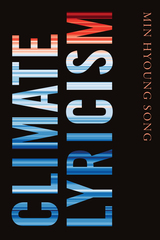
Climate Lyricism
Min Hyoung Song
Duke University Press, 2022
In Climate Lyricism Min Hyoung Song articulates a climate change-centered reading practice that foregrounds how climate is present in most literature. Song shows how literature, poetry, and essays by Tommy Pico, Solmaz Sharif, Frank O’Hara, Ilya Kaminsky, Claudia Rankine, Kazuo Ishiguro, Teju Cole, Richard Powers, and others help us to better grapple with our everyday encounters with climate change and its disastrous effects, which are inextricably linked to the legacies of racism, colonialism, and extraction. These works employ what Song calls climate lyricism—a mode of address in which a first-person “I” speaks to a “you” about how climate change thoroughly shapes daily life. The relationship between “I” and “you” in this lyricism, Song contends, affects the ways readers comprehend the world, fostering a model of shared agency from which it can become possible to collectively and urgently respond to the catastrophe of our rapidly changing climate. In this way, climate lyricism helps to ameliorate the sense of being overwhelmed and feeling unable to do anything to combat climate change.
[more]
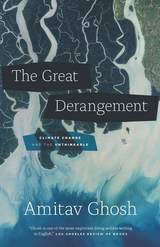
The Great Derangement
Climate Change and the Unthinkable
Amitav Ghosh
University of Chicago Press, 2016
Are we deranged? The acclaimed Indian novelist Amitav Ghosh argues that future generations may well think so. How else to explain our imaginative failure in the face of global warming? In his first major book of nonfiction since In an Antique Land, Ghosh examines our inability—at the level of literature, history, and politics—to grasp the scale and violence of climate change.
The extreme nature of today’s climate events, Ghosh asserts, make them peculiarly resistant to contemporary modes of thinking and imagining. This is particularly true of serious literary fiction: hundred-year storms and freakish tornadoes simply feel too improbable for the novel; they are automatically consigned to other genres. In the writing of history, too, the climate crisis has sometimes led to gross simplifications; Ghosh shows that the history of the carbon economy is a tangled global story with many contradictory and counterintuitive elements.
Ghosh ends by suggesting that politics, much like literature, has become a matter of personal moral reckoning rather than an arena of collective action. But to limit fiction and politics to individual moral adventure comes at a great cost. The climate crisis asks us to imagine other forms of human existence—a task to which fiction, Ghosh argues, is the best suited of all cultural forms. His book serves as a great writer’s summons to confront the most urgent task of our time.
The extreme nature of today’s climate events, Ghosh asserts, make them peculiarly resistant to contemporary modes of thinking and imagining. This is particularly true of serious literary fiction: hundred-year storms and freakish tornadoes simply feel too improbable for the novel; they are automatically consigned to other genres. In the writing of history, too, the climate crisis has sometimes led to gross simplifications; Ghosh shows that the history of the carbon economy is a tangled global story with many contradictory and counterintuitive elements.
Ghosh ends by suggesting that politics, much like literature, has become a matter of personal moral reckoning rather than an arena of collective action. But to limit fiction and politics to individual moral adventure comes at a great cost. The climate crisis asks us to imagine other forms of human existence—a task to which fiction, Ghosh argues, is the best suited of all cultural forms. His book serves as a great writer’s summons to confront the most urgent task of our time.
[more]
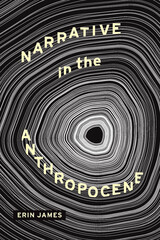
Narrative in the Anthropocene
Erin James
The Ohio State University Press, 2022
In Narrative in the Anthropocene, Erin James poses two complementary questions: What can narrative teach us about our current geological epoch, defined and marked by the irrevocable activity of humans on the Earth’s geology and ecosystems? and What can our current geological epoch teach us about narrative? Drawing from a wide range of sources—including Jane Austen’s Mansfield Park, Maria Popova’s collective biography Figuring, Richard McGuire’s graphic novel Here, Indigenous and Afrofuturist speculative fiction, and more—James argues that a richer understanding of the forms and functions of narrative in the Anthropocene provides us with invaluable insight into how stories shape our world. At the same time, she contends that the Anthropocene alters the very nature of narrative. Throughout her exploration of these themes, James lays the groundwork for an “Anthropocene narrative theory,” introducing new modes of reading narrative in the Anthropocene; new categories of narrative time, space, narration, and narrativity; and a new definition of narrative itself as a cognitive and rhetorical tool for purposeful worldbuilding.
[more]

The Ocean on Fire
Pacific Stories from Nuclear Survivors and Climate Activists
Anaïs Maurer
Duke University Press, 2024
Bombarded with the equivalent of one Hiroshima bomb a day for half a century, Pacific people have long been subjected to man-made cataclysm. Well before climate change became a global concern, nuclear testing brought about untimely death, widespread diseases, forced migration, and irreparable destruction to the shores of Oceania. In The Ocean on Fire, Anaïs Maurer analyzes the Pacific literature that incriminates the environmental racism behind radioactive skies and rising seas. Maurer identifies strategies of resistance uniting the region by analyzing an extensive multilingual archive of decolonial Pacific art in French, Spanish, English, Tahitian, and Uvean, ranging from literature to songs and paintings. She shows how Pacific nuclear survivors’ stories reveal an alternative vision of the apocalypse: instead of promoting individualism and survivalism, they advocate mutual assistance, cultural resilience, South-South transnational solidarities, and Indigenous women’s leadership. Drawing upon their experience resisting both nuclear colonialism and carbon imperialism, Pacific storytellers offer compelling narratives to nurture the land and each other in times of global environmental collapse.
[more]
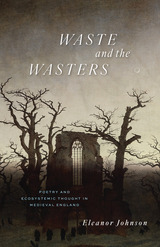
Waste and the Wasters
Poetry and Ecosystemic Thought in Medieval England
Eleanor Johnson
University of Chicago Press, 2023
A groundbreaking examination of ecological thought in medieval England.
While the scale of today’s crisis is unprecedented, environmental catastrophe is nothing new. Waste and the Wasters studies the late Middle Ages, when a convergence of land contraction, soil depletion, climate change, pollution, and plague subsumed Western Europe. In a culture lacking formal scientific methods, the task of explaining and coming to grips with what was happening fell to medieval poets. The poems they wrote used the terms “waste” or “wasters” to anchor trenchant critiques of people’s unsustainable relationships with the world around them and with each other. In this book, Eleanor Johnson shows how poetry helped medieval people understand and navigate the ecosystemic crises—both material and spiritual—of their time.
While the scale of today’s crisis is unprecedented, environmental catastrophe is nothing new. Waste and the Wasters studies the late Middle Ages, when a convergence of land contraction, soil depletion, climate change, pollution, and plague subsumed Western Europe. In a culture lacking formal scientific methods, the task of explaining and coming to grips with what was happening fell to medieval poets. The poems they wrote used the terms “waste” or “wasters” to anchor trenchant critiques of people’s unsustainable relationships with the world around them and with each other. In this book, Eleanor Johnson shows how poetry helped medieval people understand and navigate the ecosystemic crises—both material and spiritual—of their time.
[more]
READERS
Browse our collection.
PUBLISHERS
See BiblioVault's publisher services.
STUDENT SERVICES
Files for college accessibility offices.
UChicago Accessibility Resources
home | accessibility | search | about | contact us
BiblioVault ® 2001 - 2025
The University of Chicago Press



